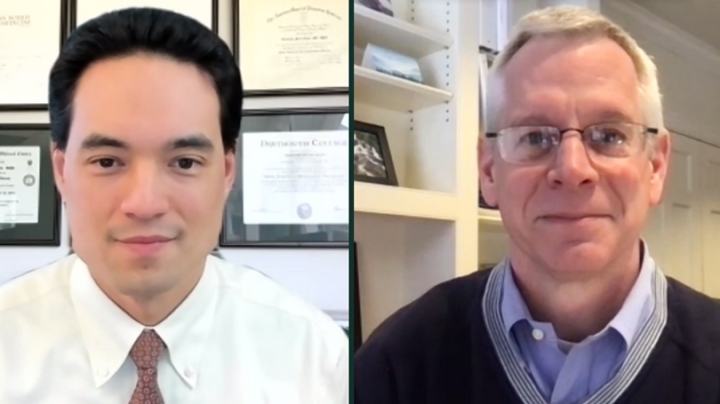Halfway through the winter term, the Dartmouth community has continued to keep its COVID-19 positivity rate steady at 0.12 percent—a level that is low relative to regional and national trends and to Dartmouth’s Ivy League peers, Provost Joseph Helble told viewers during this week’s Community Conversations webcast.
While this is reason for optimism, Helble said, he noted that Dartmouth’s COVID-19 Task Force is paying attention to the recent developments of virus mutations that may be more infectious than earlier strains, and is “exploring the mechanics and feasibility” of screening for these variants in the regular surveillance testing of the Dartmouth community.
“If we discover that there is a significant shift in the dominant strain of the virus, and if it is more infectious, then we will revisit our protocols and procedures” around group size and access to facilities, Helble said. “I don’t want to speculate much beyond that, other than to say if we see levels of transmission increasing, we will, of course, convene the task force and ask whether additional protective measures are needed.”
Helble also previewed some of the activities of winter carnival, which begins this Friday and runs through three full weekends this month. Asked if he’d had a chance to try out the new ice rinks on the Green, he admitted, smiling, “I haven’t yet gotten out on the ice. I suspect that I need to, and I’d like to before winter is over. Thank you for making me make that pledge on air.”
Helble was joined this week by Duane Compton, dean of the Geisel School of Medicine, and N.H. State Epidemiologist Benjamin Chan, Geisel ’13, for a conversation and question-and-answer session moderated by Vice President for Communications Justin Anderson.
Compton spoke about the scope of Geisel’s research programs, which “span virtually the entire spectrum of biomedical science,” he said. Geisel researchers contributed some of the early foundational work on coronavirus proteins that have successfully led to recent COVID-19 vaccine breakthroughs.
As for the impact of the pandemic on the medical school, Compton said, “Everything got turned upside-down when COVID struck,” with classroom instruction shifting to remote platforms for both the medical and master of public health programs, and in-person laboratory research was curtailed to limit the number of people in labs at any given time.
Early on, as at medical schools around the country, students doing clinical rotations were asked to stay home until hospitals gained a greater understanding of how to manage the crisis—but that soon changed, Compton said.
“Because the prevalence was low here, we had our students back in Dartmouth-Hitchcock, our primary clinical partner, earlier than other medical schools were able to,” Compton said, noting that students in clinical rotations are now eligible for vaccination as frontline medical providers.
Chan, a physician and clinical assistant professor at Geisel who earned his master of public health degree at the medical school, has been a familiar face to New Hampshire residents throughout the pandemic. He spoke about the role of public health in the practice of medicine and the need to “build bridges between the individual clinician and what happens at a state level, whether it’s responding to a pandemic or dealing with health policy issues in the legislature, or responding to community concerns.”
In response to a viewer question about the trend of wearing two masks instead of a single mask, Chan said, “The first goal is to get people to wear masks in the first place—and if people are already wearing masks, and they’re concerned, wear a better mask.”
Dartmouth’s COVID-19 prevention guidelines call for everyone on campus to wear the best masks they can, as well as to maintain a distance of at least 6 feet from others, limit gathering sizes, and practice good hygiene. According to the Centers for Disease Control and Prevention, face coverings should have two or more layers, completely cover the nose and mouth, and fit snugly against the face.
Planning for Spring Term and Beyond
Helble said there no changes in the works for the start of spring term, despite the winter term exam period ending five days later than had been originally planned, following a later start of winter term due to the pandemic. Spring term classes are set to begin on March 29. He said he expects the spring term on-campus residency rate to continue at the current level, with half of undergraduates living on campus.
“As of today, all indications are that we will be operating, once again, at 50% capacity for spring term,” he said.
Planning for spring term will be discussed on the next Community Conversations webcast, scheduled for Feb. 17. Helble said he would also have an update on the budget for the next fiscal year, which begins on July 1.
Also unlikely to change are plans announced earlier this week for a June ceremony for graduating students from all of Dartmouth’s schools, which calls for students to celebrate on campus, while family and friends view the event online. President Philip J. Hanlon ’77 this week informed the Dartmouth community of the plan, tentatively set for the week of June 6, following the end of undergraduate final exams.
“Given everything we know today, the availability of the vaccine, the distribution of the vaccine, and the difficulty of gathering a large group in a confined space … we simply don’t have a facility large enough to spread out students and family members and keep them at an appropriate distance from one another through a commencement ceremony,” the provost said.
Community Conversations is a live production of Dartmouth’s Media Production Group and the Office of Communications that airs on selected Wednesdays at 3:30 p.m.
For the most recent information on Dartmouth’s response to the pandemic, visit the Dartmouth Together COVID-19 website.


